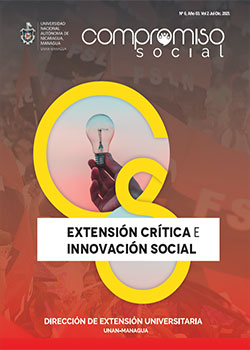Diagnosis of the main execution and development factors of the entrepreneurship projects of graduates in sustainable rural development of the University in the Field Program (2020-2021)
DOI:
https://doi.org/10.5377/recoso.v3i6.13530Keywords:
Rural development, university in the field, entrepreneurship, critical thinkingAbstract
The University to the Field Program (UNICAM) that was born from the National Autonomous University of Nicaragua and the Government of Reconciliation and National Unity represents a transcendental experience, developing theoretical and practical educational opportunities, taking the university to rural areas of the country where young people do not they have access to university education. This program was a meeting and coexistence scenario that favored the socialization and collective interaction of the group of students. The methodology of the program contributes to the construction of students that are critical and flexible to theoretical-practical learning and to life perspectives. This article focuses on the approaches that allow knowing the reality of the entrepreneurship projects carried out by graduates of the Rural Development career of UNICAM at Miraflor Headquarters, through a critical diagnosis to know their current situation - those that are working and those that are they stopped working-, as well as the contributions that these offer to the society of the territory.
To learn more about this article in depth, first visits were made to protagonists and semi-structured interviews were carried out with seven graduates. The results show that the training process was a phase to strengthen their sense of belonging to their reality, developing skills for innovation, entrepreneurship and sustainability of personal and collective resources, enabling survival strategies that places them as protagonists of changes and contributing to family and community development. Taking into consideration the findings obtained, through the following article, entrepreneurship projects represent a necessary and effective methodological strategy to achieve incorporation into the workplace. However, it is recommended to work with Information Technology Communication (ICT), as well as make links with institutions that work with small enterprises to obtain financing, as well as with other institutions.
467
Downloads
Published
How to Cite
Issue
Section
License
Copyright (c) 2021 Universidad Nacional Autónoma de Nicaragua, Managua (UNAN-Managua)

This work is licensed under a Creative Commons Attribution-NonCommercial-ShareAlike 4.0 International License.




